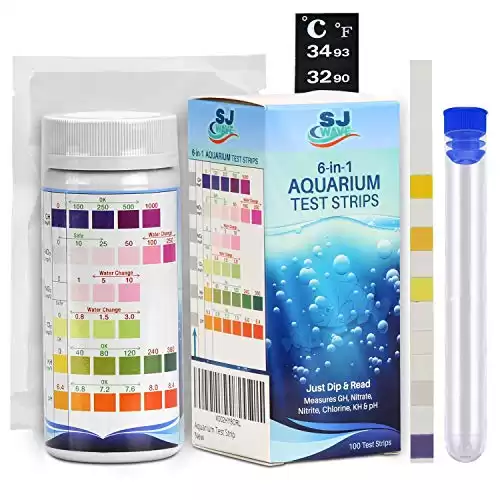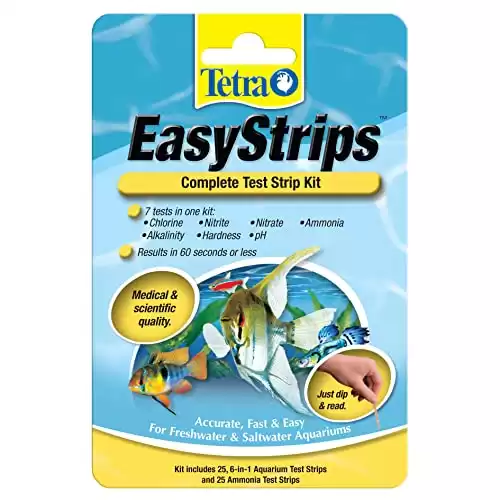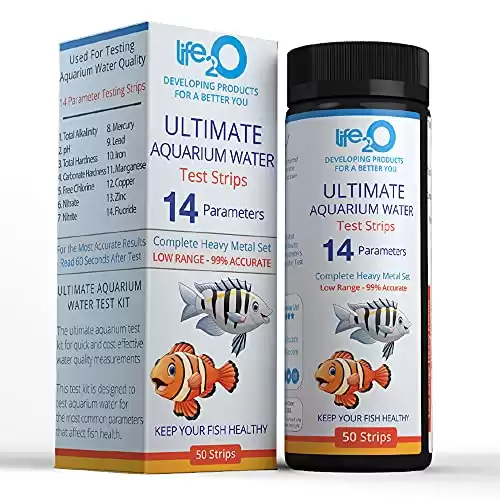Providing your fishy friend with clean, healthy water that’s safe for it to live in is crucial if it’s going to thrive. So, in addition to keeping the aquarium clean and maintaining your filter media properly, you’ll need to carry out regular checks to make sure the water parameters are correct and stable.
To do that, you’ll need to use an aquarium water testing kit. Kits come as chemicals, liquid tests, or test strips. Test strips are, in our opinion, the easiest to use, as they’re less messy than liquids and typically cheaper than chemical kits.
Read this guide to find out more about our picks for the best aquarium test strips!
|
4.6
|
4.4
|
4.5
|
What is an aquarium test strip?
Aquarium test strips are based on the old-school litmus tests you might remember from high school science class. You dipped the litmus paper into a fluid, and the paper changed color, according to whether the solution was an acid or a base. Aquarium test strips work in the same way.
Along each strip are small pads. Each pad detects a particular water parameter, like nitrite, nitrate, or pH. You dip the strip in water, allow a minute or so for the chemicals in the strip to react, and then compare the strip to the color chart that comes with the kit. Note that test strips can only be used once.
How do aquarium test kits work?
Aquarium test kits are extremely easy to use and read. In fact, test strips are by far the simplest way to check the water parameters of your fish tank. Compared to some more complex water testing systems, test strips are extremely quick to use, producing results in less than one minute.
Here’s exactly how to test your tank water using a test strip:
- Fill the test tube provided with water from your fish tank.
- Being careful not to touch any of the pads, dip one test strip into the water, swirling it around a few times to be sure all the pads are completely wet.
- Remove the strip from the water. The pads will quickly change color.
- Finally, match each pad to the color chart included with the kit to see results.
What do aquarium test kits measure?
Most test strips enable you to test for five or six different water parameters, typically nitrite, nitrate, pH, general hardness (GH), and carbonate hardness (KH). Unfortunately, ammonia is missing from this list. To test for that, you’ll need to buy a separate test kit.
How accurate are aquarium test strips?
Although aquarium test strips can provide a good indicator of whether your water quality is safe for your fish, they aren’t generally regarded by hobbyists as being 100 percent accurate.
Why not?
Test strips are considered less accurate because of the scale they use, which is very broad. Of the three forms of water testing kits, scientific meters and probes are precise but very pricey, liquid test kits are accurate and more affordable, and test strips are the least accurate and can add up to be quite expensive.
How often should I use an aquarium test kit?
If you have a new aquarium setup, you should test the water every two to three days. Although that sounds excessive, it’s really not.
The water quality in new tanks can change very quickly until the bacteria in the biological filter have become established and prolific. Although the water looks crystal clear, it can be full of ammonia, which is highly toxic for your fish. So, testing your tank water is the only way to be sure to guarantee a safe and healthy environment for your finned friend.
When you test the water, check nitrites, nitrates, pH, general hardness, carbonate hardness, free chlorine, chloramine, and ammonia levels of ammonia, nitrites, nitrates, pH, general hardness, carbonate hardness, free chlorine, and chloramine. Some kits also include tests for heavy metals.
If the water values remain at acceptable levels for one month, you can change your routine to test the water once a week. If you notice problems in your aquarium, like sudden spikes in algae growth or fish gasping at the surface, you must check your water quality immediately.
Do aquarium test strip kits expire?
Yes, aquarium test strip kits do have an expiration date.
Once the packaging is open and the strips are exposed to the air, the pads’ active reagents start to break down. That means the accuracy of the tests won’t necessarily be completely accurate.
The life of the strips varies somewhat between manufacturers, so be sure to check the packaging to find out the lifespan of the kit you’re thinking of buying. However, if you test your water once a week, you’ll easily use a full pack of test strips before they reach their recommended shelf life.
What is the best freshwater aquarium test kit?
Tetra EasyStrips
- ALL-IN-ONE TESTING KIT: Everything you need to test your aquarium water.
- 7 DIFFERENT TESTS WITH 1 STRIP: Just one test monitors ammonia, nitrates, nitrites, water hardness, chlorine, alkalinity and pH levels.
- VERSATILE: Can be used in both freshwater and saltwater aquariums.
Tetra EasyStrips are designed to test for total ammonia: ammonium (NH4+) and ammonia (NH3), chlorine, pH, carbonate hardness (KH), nitrite, nitrate, and general hardness (GH).
These test strips are sold in small numbers, so you don’t need to worry that they’ll become less accurate as time passes. The strips are easy to read when you compare them to the color chart provided. However, we recommend you double-check by retesting this with a fresh strip if the first result looks a bit odd.
One downside to this product is that the strips don’t differentiate between total chlorine or free chlorine. Chloramine is basically chlorine bound with ammonia, both of which are deadly to fish.
A total chlorine test tells you how much chloramine and chlorine are in the water, which is crucial, as that dictates what kind of water de-chlorinator you will use. A free chlorine reader doesn’t tell you if the water contains chloramine.
What We Like:
- Easy to read
- Convenient
- Comes in small batches
- Conducts several tests simultaneously
Room for Improvement:
- More expensive than liquid tests
- Doesn’t tell you if it tests total or free chlorine
API 5-in-1 Aquarium Testing Strips
- Contains one (1) API 5-IN-1 TEST STRIPS Freshwater and Saltwater Aquarium Test Strips 25-Count Box
- Monitors levels of pH, nitrite, nitrate carbonate and general water hardness in freshwater and saltwater aquariums
- Dip test strips into aquarium water and check colors for fast and accurate results
API 5-in-1 Aquarium Test Strips give you readings on the basics you need to know about once your aquarium is fully cycled, including nitrite, nitrate, carbonate hardness (KH), general hardness (GH), and pH.
API is a highly reputable manufacturer of many fishkeeping products, including water conditioners, fish medication, and water testing kits.
The main omission from these API test kits is an ammonia test. However, that shouldn’t be a problem if you maintain your tank properly and carry out regular partial water changes and filter maintenance.
If you do want to check for ammonia, you’ll need to buy a separate box of test strips, which increases the price per test, making the API product more expensive than the Tetra one.
What We Like:
- Easy to read
- Convenient
- Covers basic water parameters
Room for Improvement:
- More expensive than other similar test strips
- Excludes ammonia test
Life2O Ultimate Aquarium Water Test Strips
Life 2O Ultimate Aquarium Water Test Strips offer a very broad array of tests, including free chlorine, nitrite, nitrate, general hardness (GH), carbonate hardness (KH), pH, total alkalinity, mercury, lead, iron, manganese, copper, zinc, and fluoride.
These test strips include testing for heavy metals, which are sometimes present in domestic water supplies. Although that’s not a problem for people, many fish species are sensitive to heavy metals, so it’s important to know if they’re present in your water.
Also, if you use a RO (reverse osmosis) unit to purify your aquarium water, these tests can tell you how well the membrane is working. RO membranes eventually wear out, so if a test shows a positive result, you’ll know it’s time to replace the membrane.
Unfortunately, these tests don’t include total chlorine, only free chlorine, so they don’t tell you if your water contains chloramine. Also, there’s no ammonia test; really, it would be better to leave out a test for a substance that’s not deadly to fish and include ammonia instead.
What We Like:
- Good for checking RO unit function
- Wide range of heavy metal tests included
Room for Improvement:
- No ammonia test included
- Doesn’t include a chloramine test
SJ Wave 6-in-1 Aquarium Test Strips with Thermometer
- ACURATE AND FAST RESULTS - Strips come with a detailed color chart, detect low levels of impurities and foreign substances, help prevent any invisible water problems and keep your fish safe
- EASY TO Use: Simply dip the strip in water and compare with color chart for instant and reliable results.
The SJ Wave 6-in-1 Aquarium Test Strips test for six substances, including pH, chlorine, general hardness, carbonate hardness, nitrite, and nitrate. The kit also includes a handy thermometer so you can check the water temperature, too. You also get an e-book packed with helpful fishkeeping tips.
Although the tests include most of the important water parameters you want to check, ammonia is missing, and it’s not clear whether the chlorine test is free for chlorine or includes chloramine.
This testing kit gives you very speedy results in less than one minute, so there’s no hanging around waiting while you’re busy. And, compared with other test strips, these are pretty accurate. The main downside to the SJ Wave test strips is that they only have a three-month shelf life once opened.
What We Like:
- Accurate, fast results
- Thermometer and e-book included
- Excellent value for money
Room for Improvement:
- No ammonia test included
- Unclear whether a chloramine test is included
Aqua Care Pro 6-in-1 Aquarium Test Strips
- KEEP YOUR AQUARIUM OR POND HEALTHY - Monitoring your aquarium’s water quality is the most important thing for keeping tropical fish healthy and vibrant, and your tank looking beautiful.
- QUICK & EASY TO USE - Designed by experts, this 6 in 1 freshwater aquarium test kit is fast and easier to use than liquid test kits.
Aqua Care Pro’s 6-in-1 Aquarium Test Strips test for six things, including general hardness, nitrite, nitrate, pH, carbonate hardness, and chlorine. This test strip can be used for fish tanks and ponds, too. However, these strips are not suitable for use in saltwater aquariums.
The manufacturer provides a full set of clear, detailed instructions backed up with 24/7 customer service.
Although you only get 64 strips, that should be sufficient to last for a whole year if you test your aquarium water once a week. That makes these test strips excellent value for money. Plus, they’re easy to read and produce rapid results.
What We Like:
- Fast results
- Good after-sales customer support
- Excellent value for money
Room for Improvement:
- No ammonia test included
- Unclear whether a chloramine test is included
- Not suitable for use in saltwater tanks
What should you do if the test strip indicates problems?
If your water test produces results that indicate problems with the water quality in your tank, we advise you to carry out the test again. Sometimes, you might get a rogue test strip that gives you an incorrect or wildly inaccurate reading, so it’s wise to double-check the results.
If the water parameters are outside of a desirable range, there are a few actions you should take, depending on the issue.
Ammonia, nitrite, nitrates
If ammonia, nitrite, or nitrate levels are too high, you should carry out a 30 percent water change immediately. Check the levels again after an hour or so, and if they’re still too high, change another 10 percent of the water.
Checking that the filter media is not clogged or in need of replacement and giving your substrate a thorough clean with an aquarium vacuum cleaner is worth the time and energy. You might also need to change more water the following day.
Finally, re-test the water to make sure levels have returned to acceptable parameters.
pH and water hardness
You can raise or lower the pH level in the tank by using chemical additives you can buy from your local fish store. Ask in-store for advice on what to use, and take the test strip with you to show the store assistant.
To alter the water pH, you’ll also need to correct the water hardness levels first, and that can also be done through the use of water softeners or by switching to de-mineralized water. If the water is too soft, you might need to add a calcium-rich rock to your tank. Again, ask for advice from the experts at the fish store.
FAQs
Here are some of the most frequently asked questions about aquarium water test strips and their use:
Can I use aquarium test strips for both saltwater and freshwater fish tanks?
Some test strip kits can be used for both saltwater and freshwater tanks, but make sure you check before you buy the kit.
Do I need different test strips for different-sized tanks?
No. All the test strip kits can be used to test the water in any size of a fish tank. However, if you want to test the water in a garden pond, you might need test strips specifically designed for that purpose.
Can I use a pond water testing kit for my fish tank?
No…not accurately, anyway. Test strips for use in pools don’t test for the same things, and the readings are often skewed because the water volume is so much greater in a pond than in an aquarium. So, to get accurate readings, you’ll need to use proper aquarium test strips for your tank.
Does the water temperature in my tank affect the result of test strips?
Generally, no, it doesn’t. You can use aquarium water testing kits for both tropical and coldwater tanks. That said, don’t leave the test tube of H2O out in the sunlight, or collect it in a container that might contain dust or other contaminants that would affect the readings and potentially produce misleading results.
When should I test my aquarium water?
Unless you have a new setup that hasn’t been stabilized yet, you should test your tank water once a week. However, if your water clarity changes or your fish’s behavior alters, it’s worth testing the water to identify any problems.
It’s also a good idea to check the water quality before and after a water change and before adding new fish to the tank.
Final thoughts
Having the correct water parameters in your tank is essential for the health of your fish and plants. Although the water might appear crystal clear, that doesn’t necessarily mean all is well.
So, you should use a water test kit or aquarium water testing strips each week to test your tank water. Often, a water test can alert you to problems that might be brewing before your fish are affected.










